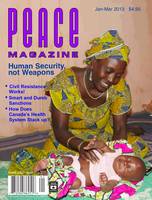
Peace Magazine January-March 2013, page 5. Some rights reserved.
Search for other articles by peacemag here
Duff Conacher’s article (Oct-Dec 2012) was very good but he should also think about the structure of the political system.
In Canada, democracy has been weakened by the increased power centred in the PMO. Its budget and its power have been increasing, starting with Trudeau and reaching its zenith with Harper. This concentration of power is inherently undemocratic. It would be good to provide the cost data so people could agitate for a limit on the PMO budget.
Don Kerr
Collingwood
The head office of the Canadian Catholic Organization for Development and Peace (D&P) is in Montreal. This organization was established by the Canadian Conference of Catholic Bishops in 1967. Its mandates are to assist and fund poor and powerless communities to help themselves and to help the poor understand the causes of poverty.
For some years there have been numerous reports of environmental and human rights violations in Third World countries by Canadian mining companies. So a few years ago in its annual educational program D&P engaged all its Canadian parishes in a study of Canadian mining operations in foreign countries. They found that mining companies, when establishing mine sites, sometimes overlooked the human rights of people living in those areas. D&P then asked its supporters to send cards of petition to the prime minister of Canada, asking him to appoint an ombudsman to observe the mining practices of Canadian companies operating outside Canada. The ombudsman would report if companies were not following the same operating rules abroad as they are required to follow in Canada. However, apparently our government decided that appointing an ombudsman would not benefit Canada—or more particularly its mining corporations.
In 1996, in the Philippines, 1.6 million tonnes of toxic mine tailings were swept into the Boac River. The company responsible for the toxic tailings was the Marcopper Mining Corporation, a subsidiary of a Canadian company, Placer Dome. The Boac River was declared biologically dead. Hundreds of families lost their homes and livelihoods; their water became contaminated; and people suffered skin and respiratory problems. Three children died from heavy metal poisoning. Yet 16 years later the people of the Boac River area have not been indemnified for their losses. Recently, our prime minister visited the Philippines to promote a mining project named “Crazy Horse,” which involved the sale of over four million hectares of Filipino land to a Canadian company. Speaking on behalf of the Filipino people in the region, Clemente Bautista Jr., National Coordinator, Kalikasan PNA, and Fr. Oliver Castor, stated that if Harper does not respect Filipino people’s sovereignty, they should pull out their mining operations. Bautista added, “We ask him to ‘mine his own business’ if their foreign capital … is detrimental to our ecological integrity and community welfare.”
In Guatemala, Goldcorp’s Marlin Mine is so controversial that it is known as “the project of death.” Cyanide is used in extracting gold and copper, which requires the use of 250,000 litres of water daily. The contaminated water endangers the health of the indigenous people.
The Inter-American Commission for Human Rights asked the Guatemalan government to suspend the mine’s operations. It has refused to do so. A young man named German Chub was shot and paralyzed from the waist down. He was the victim of thugs who single out activists opposing a Canadian mining company. There are thousands of victims of mine-related violence in the Americas. They receive no help from their police or government, and certainly none from our Canadian government.
Leo Kurtenbach
Saskatoon
President Obama’s re-election embarrasses Prime Minister Netanyahu, who has shown disdain for the president and his policies. We must, however, distinguish between the two men’s contrasting personalities and the overall US-Israel relationship, which remains strong, with unprecedented cooperation in intelligence, trade, advanced technology, and military collaboration. The animosity between them has not broken these ties, but a new clash during Obama’s second term (assuming that Netanyahu leads the new Israeli government) could impair US-Israel relations. This may well happen if Netanyahu (or his successor) does not dramatically shift his policy toward the Palestinians to calm the volatility, as shown by the recent flare-up between Israel and Hamas.
Alon Ben-Meir
New York City

Peace Magazine January-March 2013, page 5. Some rights reserved.
Search for other articles by peacemag here